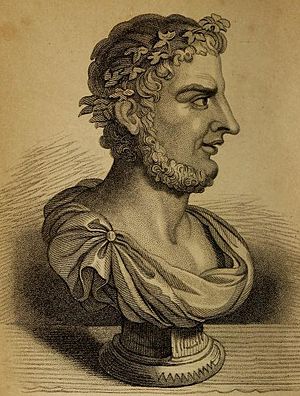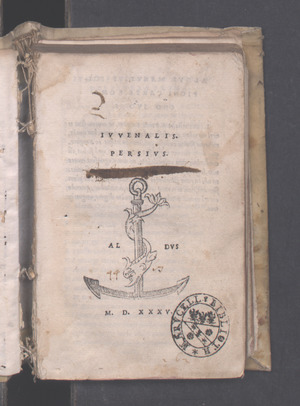Juvenal facts for kids
Quick facts for kids
Juvenal
|
|
|---|---|
| Born | 1st century CE Aquinum (modern Aquino) |
| Died | 2nd century CE |
| Occupation | Poet |
| Nationality | Roman |
| Genre | Satire |
Decimus Junius Juvenalis, known as Juvenal, was a famous Roman poet. He lived in the late 1st and early 2nd centuries CE. He is best known for his collection of poems called the Satires.
We don't know many exact details about Juvenal's life. However, clues in his poems, like mentions of people and events, help us guess when he wrote them. Some experts believe his first book was published around 100 or 101 CE. His last book was likely written after 127 CE.
Juvenal wrote at least 16 poems. They were all in a special verse style called dactylic hexameter. These poems talked about many different parts of Roman life. He followed in the footsteps of earlier Roman satirists like Lucilius, Horace, and Persius.
His Satires are a very important source for learning about ancient Rome. They show us what life was like back then. But remember, satires are often funny and exaggerated. So, we can't always take everything he wrote as a strict fact. His critical style might have even helped his poems survive through history.
Contents
Juvenal's Life Story
It's hard to know for sure about Juvenal's life. Most of what we think we know comes from old biographies. These biographies often just guessed details from his own poems.
Traditional stories say Juvenal was born in Aquinum, a town in the Volsci region. They also suggest he was the son of a wealthy freedman (a former slave who gained freedom). Some stories say he studied with a famous teacher named Quintilian. He might have practiced public speaking for fun and for legal cases. His poems often show he knew a lot about the Roman legal system. It seems he started writing his satires later in his life.
Many old stories also say Juvenal was sent away from Rome, or "exiled." This might have happened because he insulted an actor who was powerful in the emperor's court. The emperor who banished him was either Trajan or Domitian. Most stories say he was exiled to Egypt, but one even suggests Scotland!
Only one old biography gives a birth year for Juvenal: 55 CE. This is probably just a guess, but it fits with other clues. Some sources say he lived past 138 CE. It's not clear if he died in exile or was allowed to return to Rome. Modern experts think it's more likely he came back to Rome. If he was exiled by Domitian, he might have been one of the people allowed to return when Nerva became emperor.
It's tough to tell what's true and what's made up in these old stories. Many parts seem to be just guesses based on his writings. However, the idea of his exile appears in every old biography, even though Juvenal never mentions it himself. Some scholars think the exile story was made up later. They point out that his poems show he knew a bit about Egypt and Britain, which might have led to the exile stories. Other scholars, like Gilbert Highet, believe the exile was real. They suggest it happened from 93 CE to 96 CE.
There's also an old stone inscription found in Aquinum. It mentions a "Decimus Junius Juvenalis" who was a military officer and held important public roles. Most experts think this was a relative of the poet, not the poet himself. This is because the poet's writings show he didn't like military life. However, if they were related, it suggests Juvenal's family was quite well-off.
What Are the Satires?
Juvenal wrote sixteen known poems. They are divided into five books. All of them belong to the Roman style of writing called satire. In Juvenal's time, satire meant discussing society and its customs in a broad way, often using humor or criticism.
Here's how his poems are grouped:
- Book I: Satires 1–5
- Book II: Satire 6
- Book III: Satires 7–9
- Book IV: Satires 10–12
- Book V: Satires 13–16 (Satire 16 is not finished)
The individual poems (except for Satire 16) vary in length. Some are about 130 lines long, while others, like Satire 6, are nearly 700 lines. Juvenal didn't give titles to his poems, so translators often add them to make it easier for readers.
Understanding Juvenal's Satires
Juvenal's satires are known for their strong and sometimes angry criticism of bad behavior in society. Some scholars think that Juvenal used a "mask" or a character in his writing. This means he might have pretended to be angry to criticize the very attitudes he seemed to show.
It's important not to read the Satires as a perfect, factual record of daily Roman life. They are works of art that use exaggeration to make a point. Many other Roman writers, from the late Roman Republic to the early Roman Empire, also wrote about similar themes.
Juvenal's Satires also give us some information about Jewish life in Rome during the 1st century. Scholars see them as a helpful source for studying early Judaism.
Juvenal's Lasting Impact
Juvenal's Satires have inspired many writers over the centuries. For example, the famous English writer Samuel Johnson based two of his own poems, "London" and "The Vanity of Human Wishes", on Juvenal's work.
Juvenal is also the source of many well-known sayings that we still use today:
- "Bread and circuses" (panem et circenses): This means that common people care more about food and entertainment than their freedom.
- "A sound mind in a sound body" (mens sana in corpore sano): This suggests we should wish for good mental and physical health.
- "A rare bird" (rara avis in terris nigroque simillima cycno): This means something very unusual or rare, like a black swan.
- "Honesty is praised and left out in the cold" (Probitas laudatur et alget): This means honesty is admired but often doesn't bring rewards.
- "Who will watch the watchers?" (quis custodiet ipsos custodes): This is a question about who will control those in power.
The sports company ASICS got its name from a Latin phrase related to Juvenal's "a sound mind in a sound body." The full phrase is "anima sana in corpore sano."
The German writer Heinrich Böll wrote in his autobiography that his high school teacher, who was against the Nazis, paid special attention to Juvenal's poems. Böll said Juvenal's writings about unfair government, corruption, and the decline of morals felt very relevant during Nazi rule. He even bought an old translation of Juvenal and read it like a detective novel. He kept that book throughout WWII and beyond.
See also
 In Spanish: Juvenal para niños
In Spanish: Juvenal para niños
 | Jewel Prestage |
 | Ella Baker |
 | Fannie Lou Hamer |



